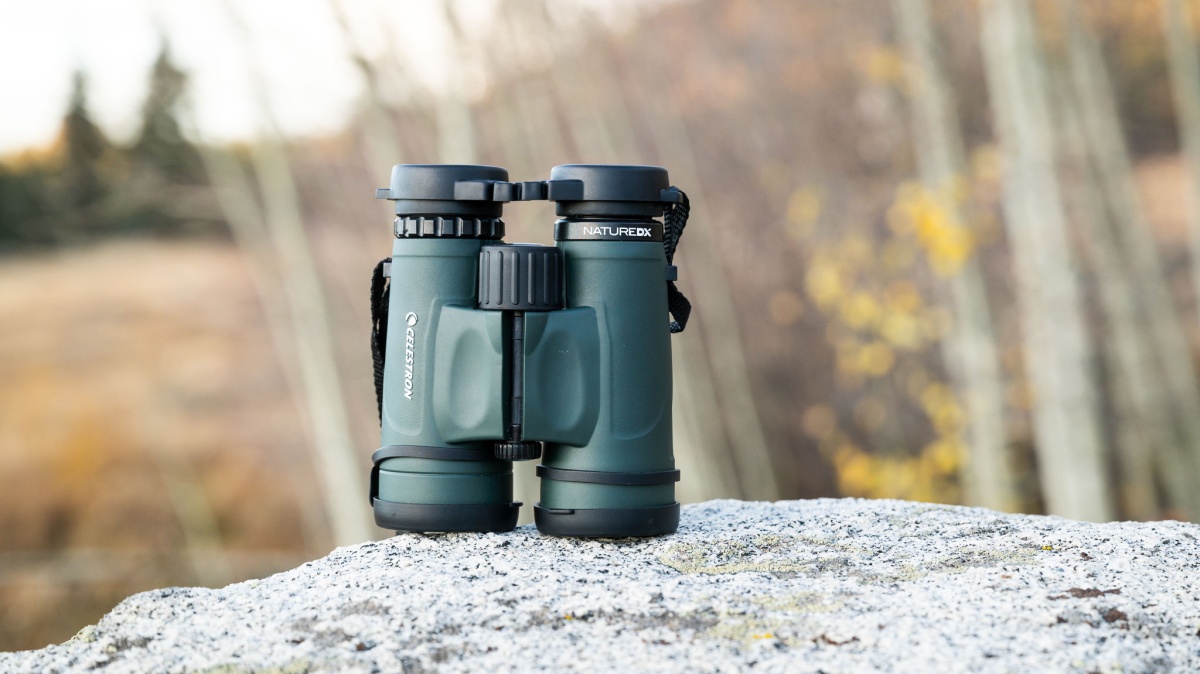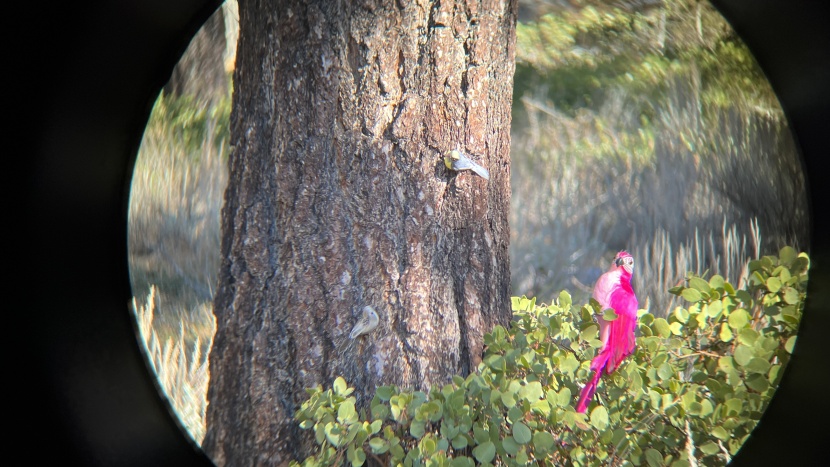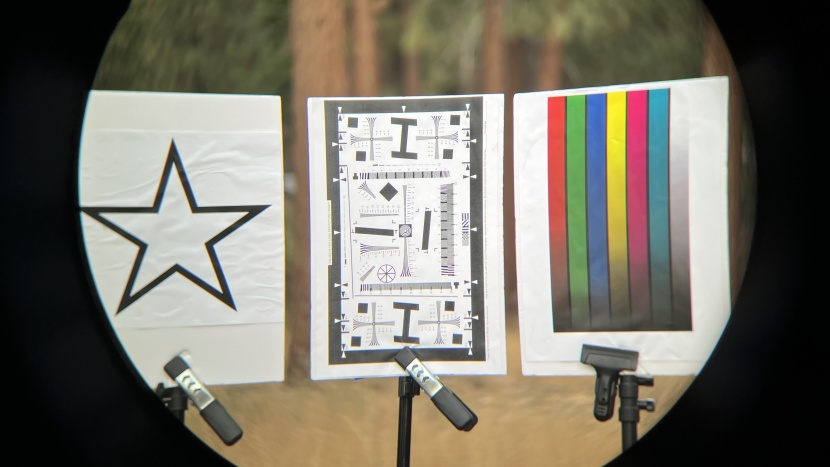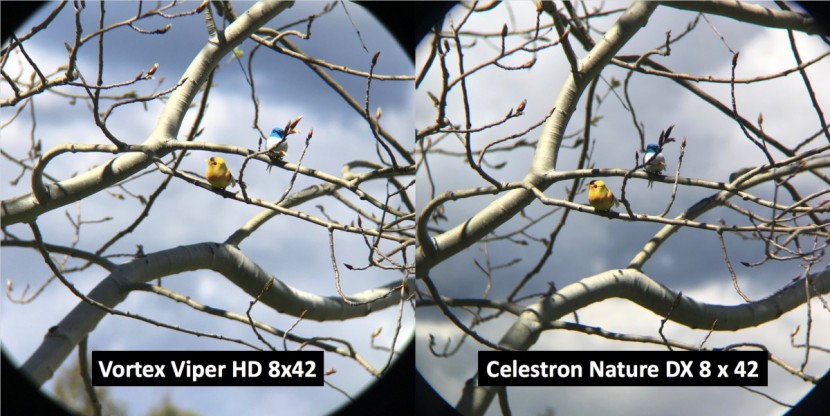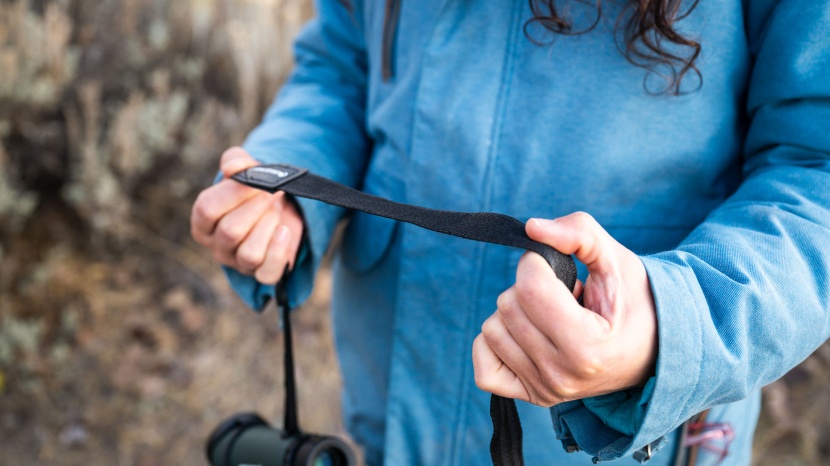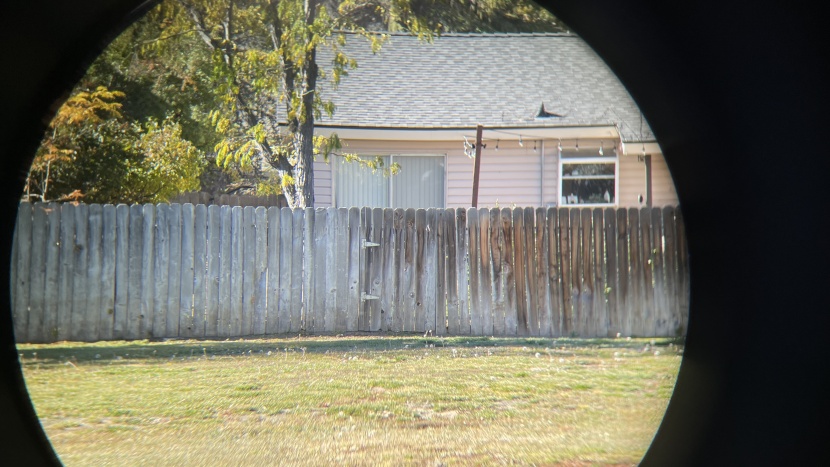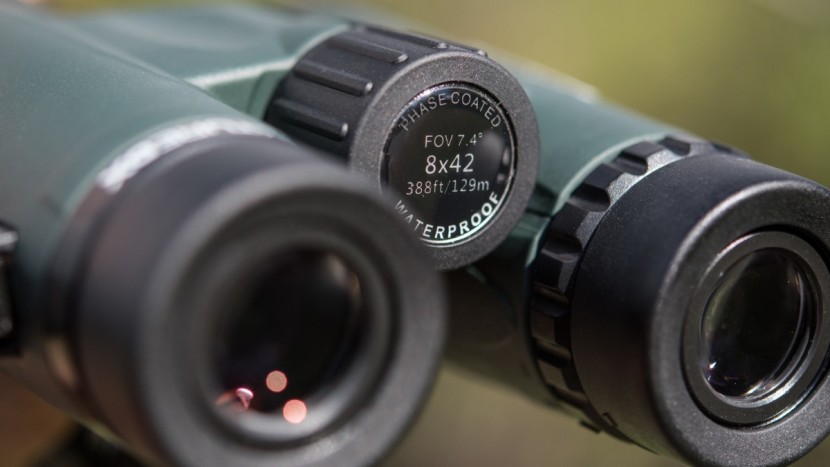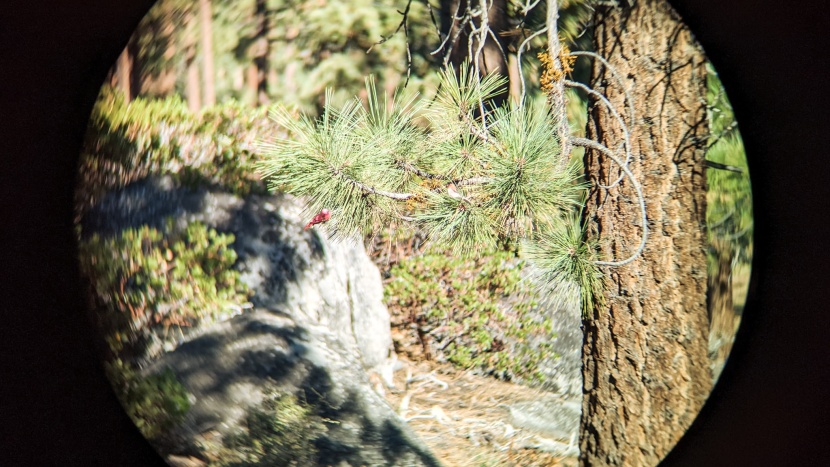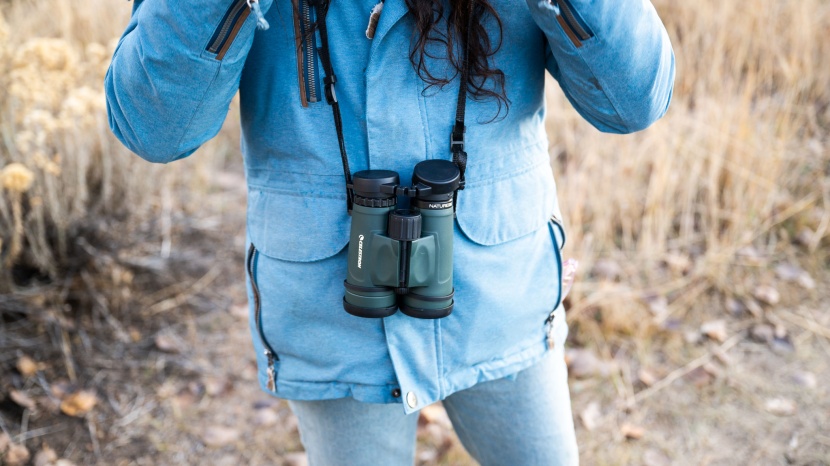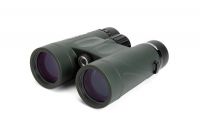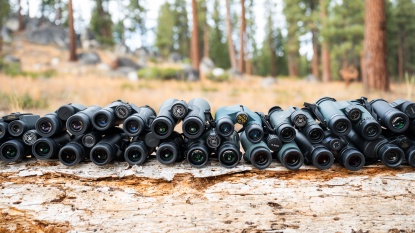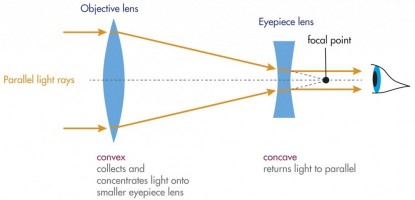
Our Verdict
Our Analysis and Test Results
The Celestron Nature DX 8x42 impressed us in our testing, especially considering the relatively low list price. With decent clarity and smooth focus, these binos punch above their weight class.
Clarity
With the Nature DX, we could consistently see the main subject looking quite sharp, with small details discernible, like the details on our test birds. This is why these binos are great for beginner birders; they can display the small but significant identification traits of small birds.
The downside of the Nature DX's clarity, when compared to more expensive models, is that the image gets a bit blurrier the farther away you move from the center. You can see in the image below that most of the branches are in focus in the competitor image, but the ones towards the edge of the Nature DX image are blurrier.
That edge blurriness makes the image feel less immersive. It's the difference between feeling like you're sitting right next to the birds and looking at a picture of the bird. That feeling of immersion is the main advantage you get from spending more on a higher-quality pair of binos, but the Nature DX still provides a good birding experience.
Brightness
In bright light, we honestly had some trouble telling the difference between the Nature DX and other higher-priced models.
It was when the light got a bit dimmer that we noticed differences. For example, the side-by-side photos below were taken within minutes of one another on a cloudy day. You can see that the other pair produced a noticeably brighter image than the Celestron Nature DX 8x42. In this cloudy situation, the difference is noticeable but not limiting, as the Nature DX image is still bright enough to display good detail on the birds.
However, in the very early morning and very late dusk, the difference becomes greater, with the Viper HD still able to display some features and color patterns of the birds, while the Nature DX produces images more akin to silhouettes with comparatively little detail. Again, this is a clear drawback, but one that probably wouldn't ruin the experience of a new bird watcher.
Comfort
The Celestron Nature DX 8x42 weighs only 22.8 ounces, which is fairly average and generally makes them comfortable to hold. However, they are small in stature and poorly balanced, so those with larger hands may feel like there isn't much space for their thumbs. We also feel that these are a little nose-heavy.
The Nature DX also lacks any ergonomic grooves in the bottom of the barrels, something that many higher-end models have that makes for a slightly more comfortable grip.
Field of View
With the Celestron Nature DX 8x42, our team was able to clearly view 56.5 fence boards, whereas top models in the lineup managed to view around 60 fence boards.
We felt this was still wide enough to enjoy looking at distant landscapes and gave enough wiggle room to track numerous birds.
Ease of Adjustment
We really love the Celestron Nature DX 8x42's focus knob, which is supple and smooth yet solidly locks in place once you stop moving it. One of the biggest frustrations for new birders is learning to quickly get their binos focused on a bird before it decides to flit away, and the Nature DX's focus knob is great for learning that skill.
The eye cups are also easy to adjust and have a couple of settings where they solidly lock in place. More than two options would be nice, but with an 18 mm eye relief, none of our testers felt this kept them from getting proper eye relief, even when wearing glasses.
The only adjustment that is a bit finicky is the diopter, which is adjusted with a separate knob that is quite stiff. This makes minor adjustments difficult, but you'll only have to adjust once when you first get the binoculars. Unfortunately, the diopter does not lock, which is on par for a model at this price point.
Close Focus Range
We measured the close focus range at 8 feet, which isn't quite as good as the manufacturer stated 6.5 feet, but it is still better than the average calculated for the entire test group. The Celestron Nature DX 8x42's close focus range of 8 feet means you'll be able to get all but the closest objects in focus. That butterfly or small finch that lands on the branch before you will look great through these binoculars.
The closest focus range we enjoyed is an impressive 4.5 feet, which would let most people focus on a butterfly that landed on their foot. While the Celestron Nature DX 8x42 can't do that, it is our expert opinion that it gets close enough. We don't envision any user missing out on an experience due to the somewhat but not exceptionally close focus range.
Should You Buy the Celestron Nature DX 8x42?
Honestly, we can't believe that the Celestron Nature DX 8x42 is so affordable considering its overall performance. However, there are some areas where the relatively low price of this model is apparent. They certainly aren't poorly constructed, but some of the materials are of a slightly lesser quality than those found on more premium models. The primary noticeable difference between the construction of the Nature DX and higher-priced models is the rubberized coating that feels like hard plastic and is somewhat less grippy.
Apart from a slightly lower-quality rubber coating and some slight blurriness at the image's edge, these binoculars feel like a more expensive pair. After many rounds of testing and retesting, as well as comparisons to other updated models, we continue to think the Celestron Nature DX 8x42 is a great option for anyone seeking good enough optics to start identifying small birds and enjoy nature without making a big investment.
What Other Binoculars Should You Consider?
The Celestron Nature DX 8x42 offers good performance at an impressively low price and is the baseline of what we'd consider a respectable full-sized pair of binoculars. However, for a slight step up in price, you can pick up the Vortex Diamondback HD 8x42, which offers a noticeable step up in performance while still staying within most budgets. If you have more to spend, consider the even better Vortex Viper HD 8x42, which is one of our favorite pairs, offering exceptional performance across the board.
| Awards | Best on a Tight Budget |
|---|---|
| Price | $180 List Check Amazon (on sale!) |
Overall Score  |
|
| Star Rating | |
| Bottom Line | One of the most budget-friendly options we've found that offers a good entry into the birdwatching pastime |
| Pros | Inexpensive, good clarity, good brightness |
| Cons | Average construction quality, mediocre low-light performance |
| Rating Categories | Celestron Nature DX... |
| Clarity (35%) | |
| Brightness (20%) | |
| Comfort (15%) | |
| Field of View (10%) | |
| Ease of Adjustment (15%) | |
| Close Focus Range (5%) | |
| Specifications | Celestron Nature DX... |
| Measured Weight | 22.8 oz |
| Measured Interpupillary Distance Range | 57mm -74mm |
| Measured Size | 5.4" x 4.5" |
| Measured Close Focus | 8.0 ft |
| Measured Eye Relief | 18.0 mm |
| Glass Type | BAK-4 |
| Magnification | 8 |
| Objective Lens Size | 42 |
| Claimed Field of View | 388 ft |
| Claimed Close Focus | 6.5 ft |
| Claimed Eye Relief | 17.5 mm |
| Waterproof/Fog Resistant | Yes |
| Tripod Adapter | Yes |
| Measured Lux Reading from Brightness Testing | 823 lux |


